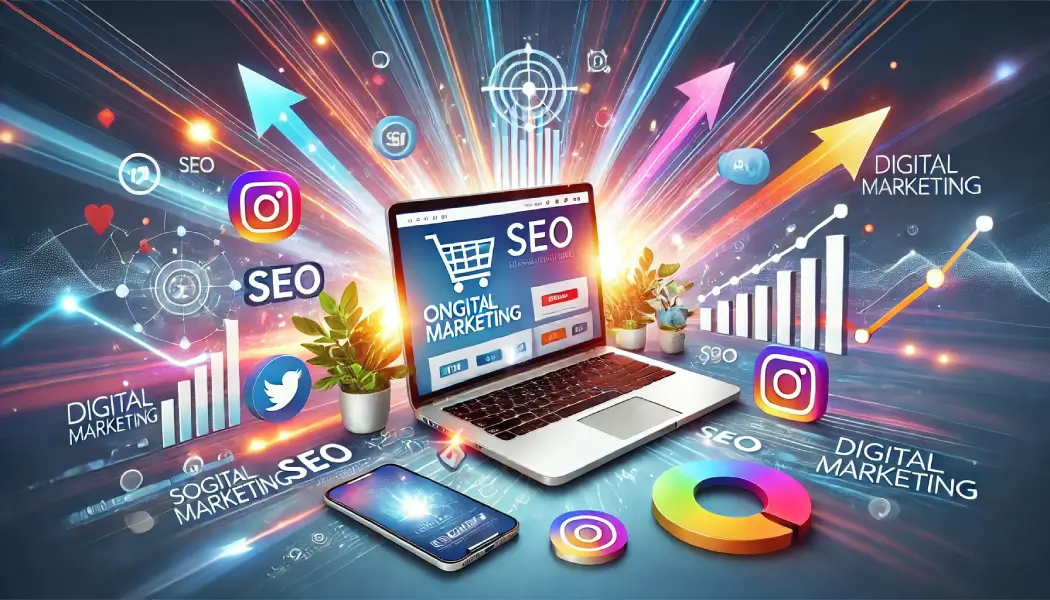Digital Marketing Consultant for Small Businesses – As a small business owner, you might be feeling overwhelmed by the complexities of digital marketing. You want to grow your business, reach more customers, and increase sales, but you’re unsure where to start or how to navigate the digital landscape effectively. Maybe your website isn’t getting the traffic you hoped for, your social media engagement is low, or your marketing efforts aren’t yielding the expected results.
This uncertainty can be frustrating, especially when you know that a strong digital presence is key to staying competitive in today’s market. Without the right strategy, your business risks falling behind, missing out on potential customers, and wasting valuable resources.
This article’ll explore how a Digital Marketing Consultant for Small Businesses can help you overcome these challenges, craft tailored strategies, and implement effective tactics that drive results. We’ll guide you through the essential steps to take control of your digital marketing and start seeing real growth.

Table of Contents
What is Digital Marketing?

Digital marketing uses online channels and technologies to promote and advertise products or services. It involves various strategies to reach potential customers through digital platforms such as websites, social media, email, search engines, and mobile apps.
Key components of digital marketing include Search Engine Optimization (SEO), which helps improve website visibility on search engines to attract organic traffic; Content marketing, where businesses create and share valuable content like blogs, videos, and infographics to engage and inform their audience; and Social media marketing, which uses platforms like Facebook, Instagram, and LinkedIn to connect with customers and promote brands. Email marketing targets potential and existing customers through email campaigns, while paid advertising (PPC) involves running ads on platforms like Google Ads or social media to reach a broader audience.
Other tactics include affiliate marketing, where businesses partner with others to promote products, and influencer marketing, which leverages influencers to reach a specific audience. Digital marketing allows companies to reach a wider audience, track performance, and make data-driven decisions, making it an essential tool for businesses in the modern, online-focused world.
Digital Marketing Consultant for Small Businesses
A Digital Marketing Consultant for Small Businesses helps small business owners navigate the complex world of online marketing to drive growth and increase sales. With expertise in various digital strategies, the consultant works closely with businesses to identify goals, target the right audience, and develop customized marketing plans that deliver results.
The consultant’s role includes improving a business’s online presence through website optimization, social media engagement, paid advertising, and SEO strategies. They also help companies measure their efforts’ success, making adjustments as needed to ensure maximum return on investment.
By offering guidance on practical digital tools and techniques, a digital marketing consultant empowers small business owners to create meaningful connections with their customers, stand out in a crowded market, and achieve their business objectives. With a focus on clear communication, strategic planning, and consistent implementation, a digital marketing consultant is an essential partner for small businesses looking to grow and succeed in the digital age.
1.Identify Your Business Goals and Target Audience
The first step to building an effective digital marketing strategy is understanding what you want to achieve. Whether it’s increasing website traffic, growing your social media following, or boosting sales, your goals should be clear. It’s also crucial to define who your target audience is. Are they young professionals, parents, or small business owners themselves? Understanding your audience’s needs and preferences helps shape your marketing approach.
When you know your goals and who you’re targeting, it makes everything else easier. You’ll be able to focus your efforts on the right platforms and tailor your messaging to speak directly to your audience. If you don’t know this, you might waste time and money on strategies that don’t work.
Imagine you’re running a small bakery. Your goal is to increase foot traffic to your store. Your target audience could be local families and working professionals who pass by your bakery on their daily commute. Knowing this allows you to focus on local SEO, social media posts about your daily specials, and perhaps even Google Ads targeting people near your location.
2.Build a Strong Online Presence
Next, make sure your business has a solid online presence. This means having a website that is easy to navigate and looks professional, along with active social media accounts that are regularly updated. Your website should highlight your products or services, including contact details, and feature a blog to engage visitors.
A strong online presence makes your business credible and helps potential customers find you. Without a website and social media, your business could be invisible to many people searching for your products or services online.
Let’s say you’re a personal trainer. Without a website or Instagram page, clients might turn to competitors with a strong online presence. But when you set up a simple website with your contact details and share workout tips on Instagram, people can find you quickly and trust that you’re an expert in your field.
3.Leverage Social Media for Engagement

Social media serves as an essential tool for small businesses. Regularly posting engaging content on platforms like Instagram, Facebook, or LinkedIn can help you connect with your audience, build relationships, and create brand awareness. Share behind-the-scenes moments, customer reviews, promotions, or educational content highlighting your expertise.
Social media enables direct interaction with your customers. Sharing valuable content helps keep your business at the forefront of your mind and encourages people to return. It’s also a cost-effective way to promote your products and services.
If you’re a local restaurant, sharing photos of your signature dishes on Instagram and asking followers to tag friends can increase your reach. Engaging with followers by replying to their comments and messages builds a loyal community around your brand.
4.Use Paid Advertising to Boost Reach
While organic efforts like social media posts and SEO are significant, paid advertising can boost your business quickly. Platforms like Facebook, Google, and Instagram allow you to target specific audiences based on their location, age, interests, and behaviors. You can set a budget that fits your business and run ads to increase traffic or sales.
Paid ads help you reach a larger audience faster. They’re handy for businesses starting or wanting to launch a new product or promotion. You can see a good return on investment (ROI) with the right strategy.
If you’re a boutique store, running a Facebook ad showcasing a limited-time sale can help drive more people to your website and encourage them to purchase before the offer expires. The ad can target people interested in fashion or who live near your location.
5.Measure and Adjust Your Efforts
Lastly, it’s crucial to track the performance of your marketing efforts. Use tools like Google Analytics, Facebook Insights, or Instagram Analytics to see what’s working and what isn’t. These tools provide data on website traffic, engagement rates, and ad performance, which can help you refine your strategy and improve results over time.
Tracking your results allows you to see if you’re meeting your goals. If something isn’t working, you can adjust your approach and focus on the tactics that bring the best results.
If you notice that most of your website visitors come from Instagram, but very few make a purchase, you might adjust your content to be more promotional or run a special offer to convert those visitors into customers.
Conclusion

As a small business owner, you may be feeling overwhelmed by the complexities of digital marketing and unsure of how to reach and engage with your audience effectively. The good news is that with the right strategies, you can turn your digital marketing efforts into a powerful tool for growth.
Here’s some advice: Focus on building a strong online presence, defining your goals, and consistently engaging with your audience. These efforts will set the foundation for your success.
As the next step, review your current digital marketing strategy and identify areas for improvement. Optimize your website, engage more on social media, and consider paid advertising options to boost your reach. With dedication and the right approach, your small business can thrive in the digital world.



